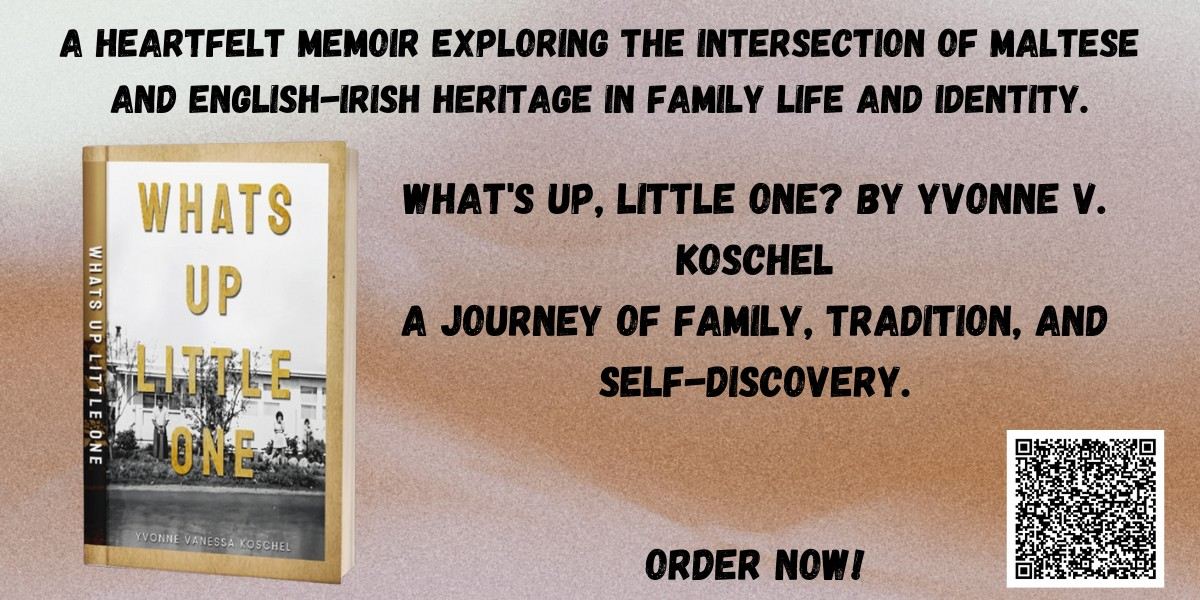By: David G. Kramer
Growing up in a multicultural household can offer a unique perspective on identity, values, and family dynamics. For children of parents from different cultural backgrounds, the intersection of these heritages may shape everything from daily rituals to how one views the world. In What’s Up, Little One?, Yvonne V Koschel reflects on her childhood, which was influenced by the blending of her father’s Maltese heritage and her mother’s English-Irish roots.
This article explores how the fusion of these two distinct cultures might have influenced her family life, providing insights into how cultural backgrounds can play a role in shaping not only individual identity but also family relationships and expectations.
The Role of Cultural Heritage in Family Dynamics
In many families, cultural heritage often plays a significant role in shaping values, traditions, and behaviors. The blending of two cultures, however, can create both enriching opportunities and unique challenges. For children of mixed cultural backgrounds, exposure to different customs and belief systems can be an educational experience, but it also may require navigating the complexities of balancing these influences.
In Koschel’s memoir, the interaction between the Maltese and English-Irish cultural influences appears to create a dynamic where both sets of traditions coexist, sometimes in tension with one another. This duality seems to manifest on various levels—from language and food to religious practices and social expectations. The differences between her father’s deeply rooted Maltese traditions and her mother’s more liberal English-Irish background likely contributed to an environment where the author often found herself navigating different cultural norms.
The Maltese Influence: Tradition, Family, and Religion
Maltese culture is often characterized by history, religious devotion, and a strong sense of familial bonds. Family in Malta tends to be at the center of life, with extended family relationships frequently playing an integral role in shaping social interactions. The sense of community is typically built around shared values, particularly those grounded in Catholicism, which holds a prominent place in Maltese identity.
Koschel’s father, with his Maltese roots, seems to have brought these traditions into the household. This may have included a deep reverence for Catholic teachings, close-knit family ties, and the importance of maintaining a sense of loyalty and duty to one’s heritage. For Koschel, growing up with this influence likely meant experiencing expectations of adherence to cultural and religious values that could have felt restrictive at times, especially when they clashed with her mother’s more modern and progressive worldview.
The Maltese emphasis on family loyalty, often accompanied by high expectations for behavior and respect, appears to have shaped the way Koschel interacted with her parents and siblings. The culture’s focus on tradition and reverence for the past may have provided a sense of stability, but it could also have introduced pressure to conform to a specific set of ideals. For someone growing up in a multicultural environment, the challenge of balancing these sometimes conflicting expectations might feel overwhelming.
The English-Irish Influence: Liberalism, Independence, and Emotional Expression
In contrast to the structure and formality of Maltese culture, the English-Irish influence in Koschel’s upbringing seems to have offered a different set of values—ones that often emphasize individualism, emotional expression, and a more open approach to life’s complexities. English-Irish culture, particularly in the context of the 20th century, was frequently marked by a more relaxed attitude toward religion and family structures. While there was still an emphasis on family, the individual’s needs and desires were often more likely to be acknowledged and nurtured.
Koschel’s mother, with her English-Irish heritage, appears to have brought a more emotional and expressive approach to parenting, which may have contrasted with her father’s more reserved and stoic demeanor. In this cultural framework, there seems to have been more space for questioning authority, challenging traditional norms, and exploring personal identity. This likely provided Koschel with the freedom to express herself emotionally, though it may also have created friction between her parents when their cultural backgrounds came into play. Her mother’s openness and her father’s more rigid values could sometimes lead to misunderstandings and conflicts in the household, creating a dynamic where cultural values were occasionally at odds.
Embracing the Complexity of Cultural Identity
Koschel’s memoir serves as a testament to the complex interplay of cultural identity and family life. Her experience growing up between her father’s Maltese and her mother’s English-Irish roots reflects the broader theme of cultural fusion in a globalized world. For individuals with mixed heritage, the challenge often lies in embracing the complexity of their identity without feeling the need to choose one culture over the other.
Koschel’s story suggests that cultural differences within families are not necessarily barriers, but rather opportunities for learning, growth, and self-discovery. Through her reflections on the intersections of Maltese and English-Irish cultures, she demonstrates how individuals can embrace the richness of their heritage while also navigating the challenges that come with it.
Summary
The intersection of Maltese and English-Irish heritage in What’s Up, Little One? offers a thoughtful exploration of how cultural backgrounds can shape family dynamics, personal identity, and emotional growth. Yvonne V Koschel’s memoir illustrates how cultural conflict, while challenging, can also serve as a source of strength and resilience.
For those interested in understanding the impact of growing up between two distinct cultural worlds, What’s Up, Little One? provides a heartfelt and insightful perspective on the journey of cultural reconciliation and self-discovery.
Check it out now!
Published by Joseph T.


















